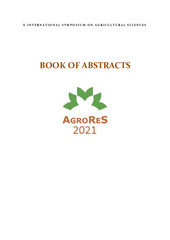Приказ основних података о документу
Antagonistic activity of bacterial isolates against Cercospora beticola in laboratory conditions
| dc.creator | Dervišević, Marina | |
| dc.creator | Đorđević, Nikola | |
| dc.creator | Knežević, Isidora | |
| dc.creator | Đorđević, Snežana | |
| dc.date.accessioned | 2022-12-10T17:53:24Z | |
| dc.date.available | 2022-12-10T17:53:24Z | |
| dc.date.issued | 2021 | |
| dc.identifier.isbn | 978-99938-93-69-1 | |
| dc.identifier.uri | http://RIVeC.institut-palanka.rs/handle/123456789/589 | |
| dc.description.abstract | Cercospora beticola Sacc. is the most economically significant sugar beet disease. In years suitable for developing the disease, the yield of the root and the total sugar content can be reduced by up to 50%. The application of chemical fungicides is a standard measure in the control of C. beticola. Still, the emergence of resistance have led to a decrease in available commercial agents'effectiveness. This study aimed to examine the efficacy of antagonistic bacterial isolates to control this pathogen under laboratory conditions. The antagonistic activity of four autochthonous bacterial isolates (Bacillus amyloliquefaciens (Priest et al.) Borriss et al. B002, Bacillus subtilis (Ehrenberg) Cohn Z3, Lactobacillus plantarum (Orla-Jensen) Bergey et al. L2 and Pediococcus pentosaceus Mees L5B) against three isolates of C. beticola (K1-2, K1-3, T2L2) was examined by dual cultivation method. In a bioassay, sugar beet leaves first were sprayed with a suspension of bacteria (2.8 x 1010 CFU/ml) after 24 hours of suspension of spores C. beticola. In the control, the leaves were sprayed only with the suspension of spores C. beticola. In each variant, there were six sugar beet leaves. After seven days, results were assessed by the Horsfall and Barratt (1945) scale. In the dual cultivation method, the highest percentage of inhibition (21.9 to 24%) was observed in the treatment with B. subtilis Z3 against all three isolates of C. beticola; B. amyloliquefaciens B002 and L. plantarum L2 showed a slightly lower percentage of inhibition, while P. pentosaceus L5B did not show any antagonistic activity against C. beticola isolates. In bioassay, isolates of B. subtilis Z3, B. amyloliquefaciens B002 and L. plantarum L2 had excellent preventive action against C. beticola. Their efficiency ranged from 87.48 to 99.17% compared to the control. These results indicate that the tested bacterial strains have good potential to control C. beticola, which can be an excellent alternative to chemical fungicides. | sr |
| dc.language.iso | en | sr |
| dc.publisher | Banja Luka : Poljoprivredni fakultet | sr |
| dc.rights | openAccess | sr |
| dc.source | Book of Abstracts : X International Symposium on Agricultural Sciences "AgroReS 2021", 27-29, May, 2021 Trebinje, Bosnia and Herzegovina | sr |
| dc.subject | sugar beet | sr |
| dc.subject | Cercospora beticola | sr |
| dc.subject | biocontrol | sr |
| dc.subject | antagonistic bacteria | sr |
| dc.title | Antagonistic activity of bacterial isolates against Cercospora beticola in laboratory conditions | sr |
| dc.type | conferenceObject | sr |
| dc.rights.license | ARR | sr |
| dc.citation.spage | 47 | |
| dc.identifier.fulltext | http://RIVeC.institut-palanka.rs/bitstream/id/1948/bitstream_1948.pdf | |
| dc.identifier.rcub | https://hdl.handle.net/21.15107/rcub_rivec_589 | |
| dc.type.version | publishedVersion | sr |


